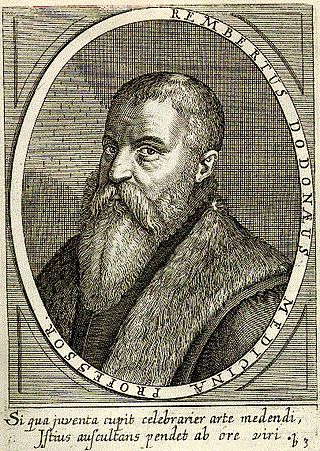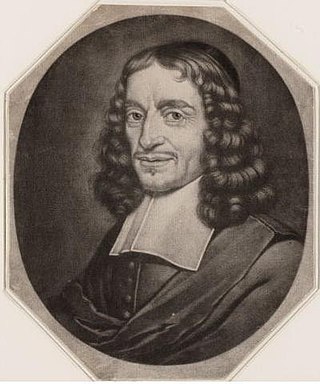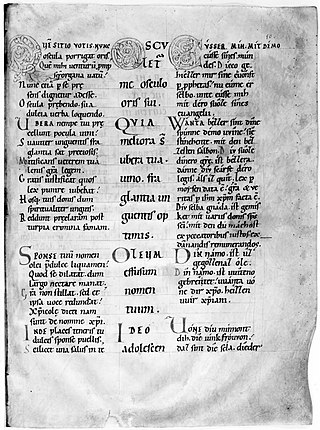
Louis Marie-Anne Couperus was a Dutch novelist and poet. His oeuvre contains a wide variety of genres: lyric poetry, psychological and historical novels, novellas, short stories, fairy tales, feuilletons and sketches. Couperus is considered to be one of the foremost figures in Dutch literature. In 1923, he was awarded the Tollensprijs.

Jan Jacob Slauerhoff, who published as J. Slauerhoff, was a Dutch poet and novelist. He is considered one of the most important Dutch language writers.

Rembert Dodoens was a Flemish physician and botanist, also known under his Latinized name Rembertus Dodonaeus. He has been called the father of botany. The standard author abbreviation Dodoens is used to indicate this person as the author when citing a botanical name.

Jacob van Lennep was a Dutch poet and novelist.

Leiden University Libraries is a library founded in 1575 in Leiden, Netherlands. It is regarded as a significant place in the development of European culture: it is a part of a small number of cultural centres that gave direction to the development and spread of knowledge during the Enlightenment. This was due particularly to the simultaneous presence of a unique collection of exceptional sources and scholars. Holdings include approximately 5,200,000 volumes, 1,000,000 e-books, 70,000 e-journals, 2,000 current paper journals, 60,000 Oriental and Western manuscripts, 500,000 letters, 100,000 maps, 100,000 prints, 12,000 drawings, 300,000 photographs and 3,000 cuneiform tablets. The library manages the largest collections worldwide on Indonesia and the Caribbean. Furthermore, Leiden University Libraries is the only heritage organization in The Netherlands with five registrations of documents in UNESCO's international Memory of the World Register.

The Digital Library for Dutch Literature is a website about Dutch language and Dutch literature. It contains thousands of literary texts, secondary literature and additional information, like biographies, portrayals etcetera, and hyperlinks. The DBNL is an initiative by the DBNL foundation that was founded in 1999 by the Society of Dutch Literature.

Gerard Brandt was a Dutch preacher, playwright, poet, church historian, biographer and naval historian. A well-known writer in his own time, his works include a Life of Michiel de Ruyter and a Historie der vermaerde zee- en koopstadt Enkhuisen.

The Old University of Leuven is the name historians give to the university, or studium generale, founded in Leuven, Brabant, in 1425. The university was closed in 1797, a week after the cession to the French Republic of the Austrian Netherlands and the principality of Liège by the Treaty of Campo Formio.
Frederick Hendrik (Henry) Habibe is an Aruban poet, literary critic and literary man.
Rolf Hendrik Bremmer is a Dutch academic. He is professor of Old and Middle English, and extraordinary professor of Old Frisian, at Leiden University.

Het Schilder-Boeck or Schilderboek is a book written by the Flemish writer and painter Karel van Mander first published in 1604 in Haarlem in the Dutch Republic, where van Mander resided. The book is written in 17th-century Dutch and its title is commonly translated into English as 'The Book of Painters' or 'The Book of Painting' and sometimes as 'The Book on Picturing'. Het Schilder-Boeck consists of six parts and is considered one of the principal sources on the history of art and art theory in the 15th and 16th century Low Countries. The book was very well received and sold well. Karel van Mander died two years after its publication. A second posthumous edition, which included a brief, anonymous biography of van Mander was published in 1618. This second edition was translated by Hessel Miedema into English and published in 1994-1997 together with a facsimile of the original and five volumes of notes on the text.

Heinrich von Veldeke is the first writer in the Low Countries known by name who wrote in a European language other than Latin. He was born in Veldeke, which was a hamlet of Spalbeek, part of the municipality of Hasselt, Limburg, Belgium, since 1977. The "Vel(de)kermolen", a water mill on the Demer River, is the only remainder of the hamlet. In Limburg, he is celebrated as a writer of Old Limburgish.

The following is a timeline of the history of Brussels, Belgium.

Rutger Velpius was a 16th- and 17th-century printer and bookseller. He was the first printer in the city of Mons, and later became printer to the court in Brussels. His career coincided closely with the first decades of the Dutch Revolt

This is a timeline of Belgian history, including important legal and territorial changes and political events in Belgium and its predecessor states. To read about the background to these events, see History of Belgium. See also the list of Belgian monarchs.
Jan Van der Stock is a Belgian art historian and exhibition curator. He is a full professor at the University of Leuven, where he lectures on Medieval and Renaissance Arts, Graphic Arts, Iconography, Iconology, and Curatorship. He is the director of Illuminare – Centre for the Study of Medieval Art and holder of the Van der Weyden Chair – Paul & Dora Janssen, the Veronique Vandekerchove Chair of the City of Leuven and the Chair of Medieval Sculpture in the Low Countries. Jan Van der Stock was the husband of Christiane Timmerman and is a father of two.
Gerard Isaäc Lieftinck, known in print as G.I. Lieftinck, was a Dutch academic specialising in medieval European manuscripts.

The Leiden Willeram or Egmond Willeram, is the name given to a manuscript containing an Old Dutch version of the Old High German commentary on Song of Solomon by the German abbot Williram of Ebersberg. The translation, since 1597 in the Leiden University Library, was done at the end of the 11th century by a monk of the Abbey of Egmond in the present day Netherlands. The literary text would be seen as the start of Dutch literature, were it not for the fact that the manuscript probably never left the abbey, so it couldn't have influenced later works.
The song Egidius waer bestu bleven is an early rondeau from Dutch literature and a famous Middle Dutch song.

Christiaan Hendrik "Hein" Eersel was a Surinamese linguist and cultural researcher.















